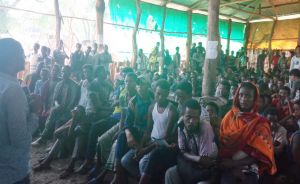Preventing potentially fatal tropical disease in thousands of migrants in Ethiopia
Addis Ababa, March 5, 2019. – More than 9000 migrant workers have received guidance on preventing Leishmaniasis – a potentially fatal neglected tropical disease - in Ethiopia’s far North-West.
Every year, hundreds of thousands of seasonal workers from across northern Ethiopia make the trek to work the farmlands of the West Gondar area, but are typically unaware of the localised risk of Leishmaniasis there.
Visceral Leishmaniasis, one of the three main forms of the disease, is fatal if left untreated in over 95% of cases. Characterized by irregular bouts of fever, weight loss, enlargement of the spleen and liver and anaemia, an estimated 50,000 to 90,000 new cases occur worldwide every year.
Leishmaniasis, which is transmitted by parasites through the bite of infected female phlebotomine sandflies, is endemic to five Ethiopian regions, as well as other East African nations.
Yet reaching people on the move with crucial health messages is not easy.
Earlier efforts to contain the disease in Ethiopia, making use solely of the healthcare system, failed to reach significant numbers of seasonal migrants, despite reaching local communities.
Yet in 2018, WHO, working with the Ethiopian Ministry of Health, the Amhara Regional Health Bureau, the labour and social affairs system and with local schools and communities, managed to reach thousands of seasonal migrants in West Gondar.
The new health promotion and communication plan works with managers from commercial farms on outreach and peer education, as well as on door-to-door awareness raising campaigns, training sessions and the distribution of public information materials on farms and through schools and the healthcare system.
The work goes on, but the lesson is clear; to reach populations on the move in northern Ethiopia, working solely through the health system is not sufficient. To ensure everyone, including all migrant workers, are made aware of the risks and prevention measures for Leishmaniasis and other neglected tropical diseases, outreach must include the labour, education, communities and other sectors.



